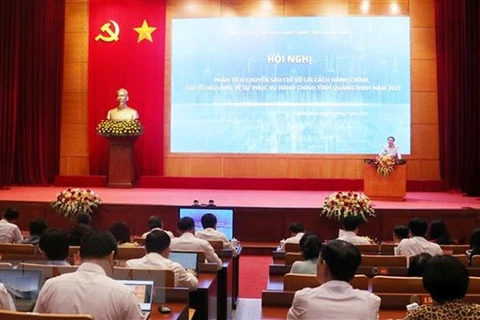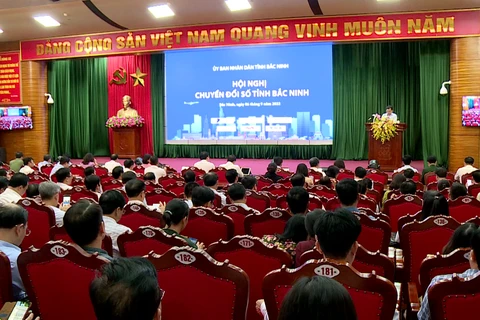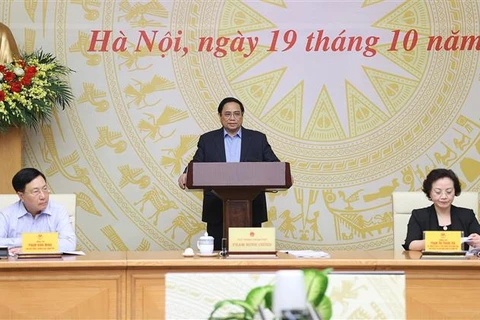Hanoi (VNA) – Administrative reform must be stepped up and conducted concertedly at all levels to match the reality, Prime Minister Pham Minh Chinh said while chairing a meeting of the Government Steering Committee for Administrative Reform in Hanoi on October 19.
Chinh, who is also head of the committee, noted that people and businesses should be the centre, subject, driving force and target of administrative reform which, he said, requires strong resolves, great efforts and drastic actions.
Time and resources should not be wasted due to negligence and bureaucracy of officials, he emphasised.
Chinh called for greater endeavours in deploying the strategy on building and perfecting a rule-of-law socialist State till 2030 with a vision towards 2045 after it is adopted.
He also ordered amending and supplementing the existing legal regulations to remove obstacles in mechanisms and policies, thereby facilitating socio-economic development.
The leader asked ministries, agencies and localities to quickly implement tasks and solutions to accelerate administrative reform, as well as the project on reforming the single-window mechanism in handling administrative procedures for 2021-2025, and the programme on reducing and simplifying regulations relating to business activities for 2020-2025.
The standardisation of results of the handling of administrative procedures on the National Database on Administrative Procedures must be completed before the end of this year, he said, requesting ministries and agencies to cut at least 20% of information needed by reusing digitalised data.
Notably, the reshuffle of apparatuses of ministries, ministerial-level agencies and government agencies must be done within this month, he said.
Chinh, who is also head of the committee, noted that people and businesses should be the centre, subject, driving force and target of administrative reform which, he said, requires strong resolves, great efforts and drastic actions.
Time and resources should not be wasted due to negligence and bureaucracy of officials, he emphasised.
Chinh called for greater endeavours in deploying the strategy on building and perfecting a rule-of-law socialist State till 2030 with a vision towards 2045 after it is adopted.
He also ordered amending and supplementing the existing legal regulations to remove obstacles in mechanisms and policies, thereby facilitating socio-economic development.
The leader asked ministries, agencies and localities to quickly implement tasks and solutions to accelerate administrative reform, as well as the project on reforming the single-window mechanism in handling administrative procedures for 2021-2025, and the programme on reducing and simplifying regulations relating to business activities for 2020-2025.
The standardisation of results of the handling of administrative procedures on the National Database on Administrative Procedures must be completed before the end of this year, he said, requesting ministries and agencies to cut at least 20% of information needed by reusing digitalised data.
Notably, the reshuffle of apparatuses of ministries, ministerial-level agencies and government agencies must be done within this month, he said.
Solutions should be drastically and concertedly rolled out to speed up the disbursement of public investment, and the implementation of three national target programmes, covering new-style rural area, socio-economic development in ethnic minority-inhabited areas and sustainable poverty reduction, and the programme on socio-economic recovery and development, the PM continued.
He also highlighted the tasks of developing the digital Government and improving the efficiency of State administrative agencies.
In the first nine months of this year, 657 business regulations in 73 documents were either cut or simplified. The plans to reduce and simplify 187 regulations in 19 legal documents were also approved.
Meanwhile, the digital transformation and the building of e-government saw great progress, with the information of nearly 100 million people updated on the national database system on the population, and over 73 million chip-based citizen identification cards provided./.
He also highlighted the tasks of developing the digital Government and improving the efficiency of State administrative agencies.
In the first nine months of this year, 657 business regulations in 73 documents were either cut or simplified. The plans to reduce and simplify 187 regulations in 19 legal documents were also approved.
Meanwhile, the digital transformation and the building of e-government saw great progress, with the information of nearly 100 million people updated on the national database system on the population, and over 73 million chip-based citizen identification cards provided./.
VNA
























